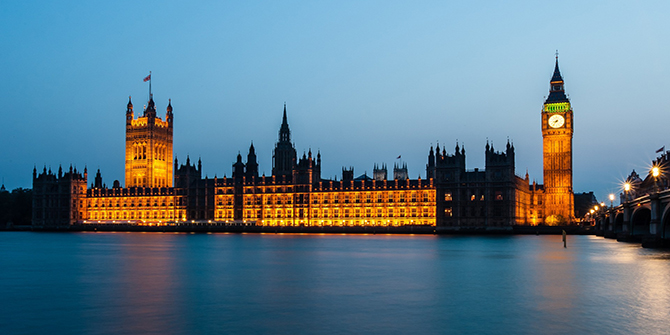Analysing the election outcomes in European countries since the economic crisis began in 2008, Lawrence LeDuc and Jon Pammett find that voters do indeed broadly exact punishment on governments in times of economic crisis, although not necessarily in greater measure than might occur in other circumstances.
Governing parties forced to face the electorate in bad economic times generally do not fare well. Historical experience tells us that voters will often punish governments for poor economic performance, even in circumstances where national governments may have had little real influence over the state of their economies. Recent elections in Europe have provided us with an opportunity to test some of these arguments, as the economies of all European countries were affected to varying degrees by the economic crisis that began in 2008 and continues today in many countries. In a recent article we assessed the extent to which the outcomes of national elections were affected by adverse economic conditions in the twenty-seven EU member countries between June 2008 and December 2011. All but three held national elections during this time and several (Latvia, Portugal, Slovenia) experienced more than one election over this three-and-a-half year period.
The national elections that we examined took place in a number of different electoral contexts, ranging from Austria and Slovenia, which held them in September 2008 just as the economic crisis was beginning to unfold, to Britain or The Netherlands, where they took place in mid-2010, well after stimulus measures were in place. A number of other countries held national elections in 2011, at a time when many European economies were beginning to recover. That recovery, however, proved to be uneven, and the onset of a new rash of economic problems (sovereign debt, bank instability, the Euro) soon placed recoveries at risk in a number of countries.
The conclusions summarized here are based on our analyses of aggregate data for the 24 countries that held national elections during the crisis period. We compared the impact of the economic crisis on the various countries using basic economic indicators such as net change in GDP and national rates of unemployment at the time of the election. We also considered contextual variables such as the impact of globalization and the presence of coalition governments, which can make it more difficult for voters to hold particular parties responsible for economic performance. Surveys showing that a majority of respondents in all EU countries rated economic conditions as “worse” than a year previously provided information on public perceptions of the severity and expected duration of the economic crisis, But there was considerable variation among the countries in expectations for recovery, with citizens of the UK, Denmark and Sweden expressing greater optimism about the economic future than their counterparts in Greece or Latvia. Our study shows:
- In 25 national elections held between June 2008 and December 2011, governing parties lost support in 20 of these. The Czech Republic and Latvia are excluded here as both had caretaker governments at the time of the elections.
- In five cases (Cyprus, Denmark, Estonia, Luxembourg and Slovakia) governing parties improved their standing despite poor economic conditions.
- In all of the other cases, the governing party lost ground, and in a number of those instances (Bulgaria, Hungary, The Netherlands, Romania, Ireland, Spain), the loss was devastating.
- In all, the governing party was removed from power in 16 of the 25 elections.
Of course, parties in power often see their share of the popular vote decline, even in better economic times, and governments can be defeated in elections for other reasons. A comparison of results for the countries holding national elections in the 2008-11 period with those of a previous electoral cycle, in which economic conditions were more positive, found that the average net loss sustained by governing parties in the elections considered here (-8.1%) was less than two percentage points greater than the loss sustained by governing parties in the previous national electoral cycle for the same countries (-6.5%).
Our overall conclusion therefore was that voters do indeed broadly exact punishment on governments in times of economic crisis, although not necessarily in greater measure than might occur in other circumstances. But we also observed that parties of the center left that were in government during this time fared worse in the elections than those of the center right. It may be that the campaign strategies typically followed by parties on the right of the political spectrum (although not the far right) have more credibility with voters in times of economic hardship. This is a topic that we hope to investigate further in future research.
This article was originally published on the PSA Insights blog.
Note: This article gives the views of the author, and not the position of the British Politics and Policy blog, nor of the London School of Economics. Please read our comments policy before posting.
Lawrence LeDuc is Professor of Political Science at the University of Toronto. Jon H Pammett is Professor of Political Science at Carleton University. Their article ‘The Fate of Governing Parties in Times of Economic Crisis’ is forthcoming in Electoral Studies. They have also written on ‘The Electoral Impact of the 2008 Economic Crisis in Europe’, published in Joan DeBardeleben and Crina Viju (eds.), Economic Crisis in Europe: What it Means for the EU and Russia. Basingstoke: Palgrave Macmillan, pp. 87–111.







